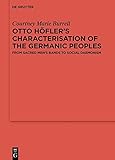Otto Höfler’s Characterisation of the Germanic Peoples : From Sacred Men’s Bands to Social Daemonism / Courtney Marie Burrell.
Material type: TextSeries: Ergänzungsbände zum Reallexikon der Germanischen Altertumskunde ; 140Publisher: Berlin ; Boston : De Gruyter, [2023]Copyright date: ©2023Description: 1 online resource (IX, 370 p.)Content type:
TextSeries: Ergänzungsbände zum Reallexikon der Germanischen Altertumskunde ; 140Publisher: Berlin ; Boston : De Gruyter, [2023]Copyright date: ©2023Description: 1 online resource (IX, 370 p.)Content type: - 9783111032382
- 9783111032979
- 9783111032917
- 930
- BL860 .B966 2023
- online - DeGruyter
- Issued also in print.
| Item type | Current library | Call number | URL | Status | Notes | Barcode | |
|---|---|---|---|---|---|---|---|
 eBook
eBook
|
Biblioteca "Angelicum" Pont. Univ. S.Tommaso d'Aquino Nuvola online | online - DeGruyter (Browse shelf(Opens below)) | Online access | Not for loan (Accesso limitato) | Accesso per gli utenti autorizzati / Access for authorized users | (dgr)9783111032917 |
Dissertation LMU 2021.
Frontmatter -- Foreword -- Contents -- Part I: Contextualising Otto Höfler’s Germanenbild -- 1 Introduction -- 2 A (Short) History of Germanenbilder and Germanenbegriffe in Historical Scholarship -- 3 Germanenbilder in German Philology of the First Half of the Twentieth Century -- Part II: Analysing Otto Höfler’s Germanenbild -- 4 Otto Höfler’s Research on ›Germanic Culture‹: The ›Germanic‹ Sacred Men’s Bands -- 5 Otto Höfler’s Research on ›Germanic Culture‹: Further Components -- 6 Significant Aspects of Otto Höfler’s Germanenbild -- 7 A Comparative Analysis of Otto Höfler’s Germanenbild -- 8 Concluding Discussion -- List of Abbreviations -- Bibliography -- Register of Names
restricted access online access with authorization star
http://purl.org/coar/access_right/c_16ec
Otto Höfler (1901–1987) was an Austrian Germanist and Scandinavist. His research on ‘Germanic culture’, in particular on Germanic Männerbünde (men’s bands), was controversial and remains a topic of academic debate. In modern discourse, Höfler’s theories are often fundamentally rejected on account of his involvement in the National Socialist movement and his contribution to the research initiatives of the SS Ahnenerbe, or they are adopted by scholars who ignore his problematic methodologies and the ideological and political elements of his work.The present study takes a comprehensive approach to Höfler’s research on ‘Germanic culture’ and analyses his characterisation of the ‘Germanic peoples’, contextualising his research in the backdrop of German philological studies of the early twentieth century and highlighting elements of his theories that are still the topic of modern academic discourse. A thorough analysis of his main research theses, focusing on his Männerbund-research, reveals that his concept of ‘Germanic culture’ is underscored by a belief in the deep-seated religiosity of the ‘Germanic peoples’ formed through sacred-daemonic forces.
Issued also in print.
Mode of access: Internet via World Wide Web.
In English.
Description based on online resource; title from PDF title page (publisher's Web site, viewed 06. Mrz 2024)


